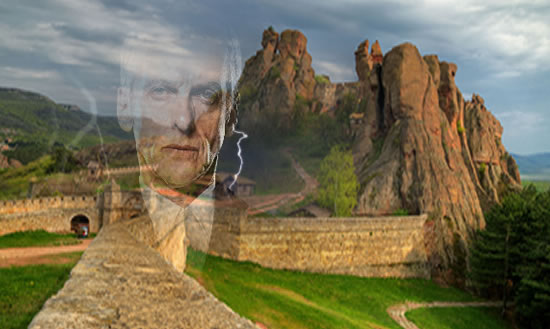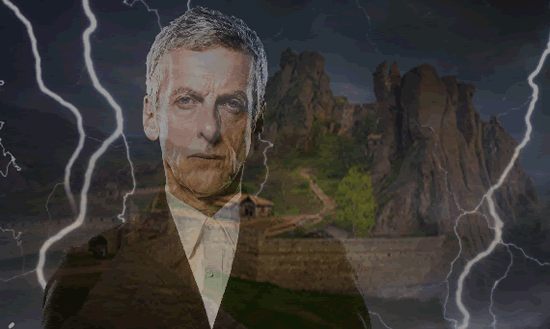

Marie stepped out of the TARDIS and looked around the distinctly castle-like walls that surrounded her. Then she looked up above the walls and saw what looked, at first glance, like a castle rising above this defensive structure.
On second glance, only one part of it was a deliberate structure. What she had taken to be towers and turrets were actually weather worn rock much like the bluffs and massifs of Death Valley in the USA. The castle had been built within the natural rocks to form a very unique defensive position.
“This has to be the most alien place you’ve ever brought me to, Doctor,” she commented as her travelling companion and mentor locked the police box and came to join her, slipping on his sonic shades against the glare of a bright sun.
“Actually, we’re in Bulgaria in your own time,” he replied.
“Really?” Marie was surprised. Then again, what did she actually know about Bulgaria? Eastern Europe, never won Eurovision – did they even enter? – a Womble named after it. That was about it.
“Why?” she added a little later.
“I always wanted to come here,” The Doctor replied. “It’s one of the most alien looking landscapes on your planet.”
“Ok.”
“Belogradchik Fortress,” The Doctor added, helpfully. “A UNESCO protected national monument of historical and architectural interest.”
Marie looked around again, armed with the knowledge that this place was held in such high regard. The walls currently surrounding her formed a long rectangle that was clearly designed for defence. There was a platform about eight feet from the ground with battlements. Marie was sure there was a military-sounding term for it, but she couldn’t think what it was. Anyway it was obvious that soldiers would have lined it with guns – or perhaps earlier than that with bows and swords, fighting off attackers coming to take the fortress. Presumably, she thought, there would have been barracks and a mess hall, an armoury, stables for horses that were now long gone, only these fantastic outer walls remaining.
There was a quite elaborately designed arched gateway at the end of the rectangle leading to another defensive structure. A rough road made for horses and horse drawn vehicles ran through the whole. It was a protected road up through the mountains.
“Who was it protected from?” Marie asked. She pictured a map of Europe in her head and found Bulgaria in the far corner. “Turkey? Was it hordes of Turks trying to invade?”
“The Romans built the first fort to defend the road from everyone who wasn’t Roman,” The Doctor replied. “Then the Bulgars needed to watch for the Byzantine invaders. That’s Turkey in its empire days, of course. Then when the Byzantines captured this area the fort was used by them to keep down Bulgar rebels.”
“So it’s been one big game of ‘king of the castle’ for getting on for a thousand years, then?”
“Pretty much. If you want the fine details, there’s a visitor’s centre back that way. I dare say you can buy a book.”
“Visitor’s centre, ugh,” Marie responded. “Nothing spoils places like this more than some modern building tacked on full of keyrings and postcards and an over-priced coffee shop.”
The Doctor grinned toothily.
“Quite right. Let’s wing it, shall we?”
“Let’s.”
They were both prepared for a hike, Marie in strong boots, slacks and sweatshirt with a jacket for an inclement turn in the weather rolled up on top of essential supplies in a backpack. The Doctor was in dark check trousers and a hoodie top with the strings hanging loose. He, too, had a backpack. It looked bigger and heavier than hers. Surprisingly, The Doctor could be quite chivalrous about that sort of thing.
They passed through the first gate and a slight incline brought them to the next. This was easy, yet. The real slog was up the steep incline to the high fortress wall between the rocks.
It had been made easier a long time ago by the cutting of steps in the rock, but it was a very long time ago and some of the steps were worn down. Caution had to be taken. Marie wondered casually if Bulgarian Health and Safety rules were as tough as Irish ones. No
national monument she knew of had such precarious steps. She wondered if anyone had ever tried to sue for twisted ankles and thought it unlikely.
“On the planet Eckersly-Bounty the authorities sue anyone who falls on their monuments, not the other way around,” The Doctor said with an uncanny knack of knowing what she was thinking without asking. “They reason that anyone paying so little attention is not respecting their culture fully and therefore disrespecting the ancestors who built said monuments. Disrespecting the ancestors is a major issue to the people of Eckersley-Bounty.”
“Don’t take my friend Roisín, then. She could fall over on lino.”
“I knew somebody like that, once,” The Doctor replied with a suddenly distant look in his eyes. Then just as suddenly he was smiling and telling her about the Tower of a Thousand Steps on the planet Haddon in the Neva system and the long lines of pilgrims who climbed the steps around the outside of the tower for just one glimpse of the fabulous golden statue of Haddon the Great at the top.
“There was a lift back to the ground,” he finished. “And a little bookshop and café in the atrium.”
“I don’t think I’d mind a lift back down from here,” Marie commented between deep breaths. “But I suppose we can take our time about it?”
“Didn’t I mention?” The Doctor asked with sudden vagueness. “We’re not heading back down for a while. We’re joining a friend of a friend of mine who is camped up here doing a geological survey of the Belogradchik Rocks.”
“No, you didn’t mention,” Marie answered. “I thought this was just an afternoon hike and a bit of a picnic and home to the TARDIS before nightfall.”
“Well, that would be a terrible waste anyway. The sunset up in the rocks is delightful and the sky is clear and bright, well away from any light pollution. You’ll like it.”
“I didn’t bring any spare clothes,” she pointed out. “I hate wearing the same things for two days in a row, especially if I’ve slept in them, inbetween.”
“All sorted,” The Doctor assured her, pointing to the backpack he was carrying. “Tent, clothes, torches, camping stove. You’ve got the food. What more do we need?”
“Batteries for the torches, marshmallows, long-haired hippie student with a guitar playing kum-by-ya in the starlight?”
“I tried, but his incense sticks kept getting stuck in the flap,” The Doctor replied, sharing the humour with her. “We’ll have to see what my friend has organised for evening entertainment. Knowing his family, it might well be kum-by-ya.”
“I hope not,” Marie admitted. “That’s one really irritating song. I’m trying to avoid getting it stuck in my head talking about it.”
They walked on in silence, trying to avoid earworms settling in. The incline was hard work and Marie needed all her breath to match The Doctor’s pace even though she was sure he had slowed down to make it easier for her.
Not that she was struggling, as such. She was young and fit and this wasn’t the first mountain she had climbed. She had been up to the Hell Fire Club many times, and hiked with her fellow teachers in the Wicklow mountains. She was looking forward to an uninterrupted look at the view she only glimpsed as they climbed.
And that was well worth the effort. As they reached the fortress wall built between the natural turret shaped rocks she turned and looked over several hundred miles of Bulgaria stretching into the distance. Closer to, those rectangle courtyards of the fortress looked like the model they were bound to have in the visitor’s centre while the actual town of Belogradchik huddled in the valley, mostly small, low houses with red tiled roofs.
“The world always looks peaceful from mountaintops,” Marie observed. “Which is a bit of a contradiction here, since this was the gap of danger for all those Romans and Barbarians, Marauding Turks and Rebellious Bulgars. This peaceful scene must have seen all sorts of bloodshed over the centuries.”
The Doctor nodded. If he let his mind concentrate hard enough he could hear the echoes of those battles, see the blood on the ground.
He preferred not to.
“Hey, there, are you The Doctor?” A young woman dressed for hiking appeared at the ‘door’ to the mountain fort. “We’ve been expecting you. Come on in.”
“Well, it’s nice be expected,” The Doctor declared. He waved to Marie to go in first and followed her.
Within the fortress, a thoroughly professional survey camp had been established. As well as tents for sleeping in there were canopies under which people were performing
experiments with rock samples. There was a digital equivalent of a dark room with images produced on a portable digital printer, and in the furthes corner from all of that the least popular but most necessary, chemical toilet tent.
The Doctor’s friend didn’t come from any of the tents, but from high on the battlements where he had been taking measurements with a theodolite. He was in his early forties, light skinned and sandy haired. He was wearing khaki shorts and shirt with hiking boots and a wide brimmed hat of the sort Australians were reputed to hang corks from.
“Clifford Grant-Jones, PhD,” The Doctor called out cheerfully. “How are you, these days? Have you heard from your mum and dad lately?”
“Doctor, you’re looking well,” Clifford Grant-Jones replied as he shook hands. “Mum and dad are protesting against fracking in Western Australia. The last I heard mum was trying to get arrested so that she could make a big martyr’s speech in court.”
“She hasn’t changed a bit, then,” The Doctor responded. “Let me introduce you to my friend, Marie Reynolds, from Dublin, who is a bit bewildered at the moment.”
“No, I’m not. I’ve read about some of the Professor’s work. The Secret Cave Writings of Machu Picchu, Nazca Lines Explained, the Underhenge. National Geographic is my favourite read in the school staff room. And if you are THAT Clifford Grant-Jones, then your father must be THE Clifford Jones with the three Nobel Prizes. And I’ve seen your mum on TV a couple of years ago protesting about the proposed motorway going past the Hill of Tara. The government had her deported back to Britain in the end.”
“That’s Jo Grant, all right,” The Doctor concurred.
“So how do you know her?” Marie asked him.
“I taught her everything there is to know about fighting impossible fights,” he declared proudly. “She was barely more than a teenager then, of course, but her mind was open and she was ready to learn.”
Clifford’s mother had to be in her sixties at the least, and The Doctor looked no more than mid-fifties. But nobody questioned the absurdity of that claim. Did they all know he was an alien who was thousands of years old, or was there something about his voice that lulled people into believing everything he said?
Either way, Marie and The Doctor were welcomed into the camp. They were invited to sit by the four ring calor gas stove that passed for a camp fire in the absence of any but a few straggly trees that the wouldn’t yield much in the way of a campfire even if the protected status of the area didn’t extend to the greenery. A kettle was boiling and tea quickly made in unbreakable enamel mugs with the logo of the University of Aberystwyth on the side.
“Just the thing after all that climbing,” The Doctor declared. “So, tell me what’s so fascinating about this place to a bunch of Welsh post-graduates?”
“Many things,” Clifford explained. “Myself, I’m making a detailed cartographic survey of the area. Neil over there is photographing them with ordinary lenses and infra-red and other filters. Heather and Frank are studying the chemical composition of the rocks. Martina, the lady who came to greet you, is interested in the folklore and legends that go with almost every outcrop you see around you. She is collecting them for a book – illustrated with beautiful charcoal and pen drawings by Ted, sitting over there doing a quick caricature of The Doctor.”
“Tales by the campfire?” The Doctor smiled widely at Martina who had sat down opposite them. “I was going to tell you all about my nights on the Kalahari, but this sounds much more pertinent.”
“Well, the first story is about that rock up there,” Martina said, pointing to a tall, lumpy outcrop. “It’s called ‘The Dog’. The story is that the dog was the faithful companion of a gentle but eccentric old man who was often to be seen wandering amongst the rocks in the twilight. One terrible day, he fell and died with the dog at his side to the last. It was many days before anyone found the body and the poor faithful dog, hungry and cold guarding him. People tried to care for the animal, but it kept going up to the rocks where its master used to walk. Then, one evening, there was a thunderous crash and the twilight became for a moment as black as full night, but without stars or moon, and when the people could see again the new rock was there, shaped like a huge dog, and the faithful creature who mourned his master was never seen again.”
“Greyfriars Bobby with special effects,” joked Frank, the geological chemist.
“Yes, but….” Marie looked up at the rock in question. “It doesn’t look anything like a dog.”
“Not so much from this angle, right beneath it,” Ted explained. “But look at it another way.”
Neil, the photographer, passed her a tablet with a photographic slide show displayed. He pointed out his picture from below in one of the courtyards of the fortress. At the same time, Ted flipped his sketchbook and showed her his artistic rendition of the same image.
Marie gasped. Now that it had been pointed out, she could clearly see a huge shaggy dog sitting upright with its ears pricked and a thick tail behind. But would she ever have seen it if nobody had told her to look for a dog.
“Another story surrounds a group of rocks over that way,” Martina continued. “The Monks and the Nun. The story goes that there was once a monastery and a nunnery here in the mountains. One very beautiful young nun was courted by a handsome nobleman, and though she tried to keep to her vows she fell in love with him. Eventually, she had a baby and her ‘sin’ came to light. She was cast out with the child, to starve and die because she was shunned by all. The monks were driving her away when there was a great noise and day became night. The monastery fell into a chasm and was destroyed while the nun and her child and the monks were all turned to stone.” Martina paused as Neil showed Marie images of a series of rocks that, with a little imagination might be seen as cowled monks and a cloaked woman with a child in her arms.
“Another popular one is of a beautiful young schoolgirl who was admired by a prince who she met secretly at a well or watering hole. A vicious and jealous dervish also desired her and chased her into the mountains. Her lover tried to reach her but there was….:”
“A terrible crash and day became night….” Frank the geologist gently teased Martina by finishing her tale.
“Actually, in this one, night became day and the rocks that looked like a girl pursued by an evil man and the lover on his horse were seen ever since.”
“Speaking as a teacher I don’t like the idea of a schoolgirl with a lover or a pursuer,” Marie pointed out as she looked at photographs and artistic embellishments of this set of rocks. “That doesn’t read very well in a modern context. And there’s a suspicion of racial profiling in the ‘dervish’ which I suppose would be a nasty Turk trying to ravish a young Christian girl from the put upon Bulgar community.”
“I agree,” said Heather, Frank’s geological partner. “Creepy stories all round, including the dog, and some very weird morality with all these innocent girls turned to stone. Not my favourite fairy tales, that’s for sure.”
“Nor mine,” Marie agreed. “Sounds like the sort of stuff you get in Irish folklore. There’s a rock in Sligo with a split in it, that is supposed to close around liars and false lovers if they go between it three times.”
“Have you tried it?” The Doctor asked her with a sly smile.
“No. The rock is in the middle of a really muddy and PRIVATE farmer’s field and I have better things to do.”
“Excellent answer,” The Doctor told her. Clifford Grant-Jones, son of a three times Nobel Prize winner thought so, too. She felt a little smug about that, then wondered if she should.
“The idea of collecting these folk tales is commendable,” The Doctor told Martina. “We all need colourful stories in our lives. But I can’t help wondering about the atmospheric excitation that is such a common feature of all the tales. A great noise, night becoming day or vice versa. Surely all you bright young scientific minds have wondered about that?”
He looked steadily at them all. Of course none of them had specialised in meteorology, but scientists learnt to question everything. He knew they would have some ideas.
“Ball lightning would explain night turning to day in a localised area,” Clifford said. “But I’ve never heard of anything that does the reverse.”
“I have,” Heather said. “It was ages ago. I was fifteen. We went to London on a ‘hotel and show package’ to see Les Miserables, but I got ill and I was rushed to hospital with appendicitis. Hope Hospital. The day after my operation when I was still groggy and couldn’t get out of bed was when it happened. First the rain went up instead of down, then there was a huge crash and suddenly it was dark outside. People were screaming and some of them said we were on the moon. I don’t know what really happened, but from my bed I could see the night sky with stars in it. And then, a bit later, there was another crash and the rain going up again, and it was day again. Later, my mum and dad came to see me and they were really upset and said they were arranging to move me to another hospital.”
Marie was not the only one who looked at her in silence. Even in Ireland the disappearance and reappearance of that hospital had been reported as a mystery akin to the Bermuda Triangle. There were all sorts of wild theories then and ever since.
Marie had never met anyone who was inside the hospital before. It was the first time she had heard that side of the story.
“Heather,” The Doctor said very gently. “Remind me later to have a little chat to you about that day.”
Heather was surprised by that remark. Marie was, too. Then she realised something she ought to have realised before now. When hospitals disappear into thin air, the only reason they come back again is almost certainly The Doctor.
“Even so, I’m afraid rain going up doesn’t help explain the local phenomena,” he continued. “That was something else, entirely. But it does stand as proof that not even Doctors of Science and Professors from Aberystwyth, not even those who are sons of Nobel Prize winners, know everything - because none of us have an answer to this one.”
“Not even you, Doctor?” Clifford asked.
“Not yet,” The Doctor answered.
“The obvious answer,” Frank suggested. “Is that they are all fairy stories and there is no scientific basis for any of it. We’ve all been carried away by the romance of it all. Besides, these rocks have been here since the mighty forces of plate tectonics pushed the mountains skywards. The shapes are the result of natural erosion.”
Martina and Heather both looked deflated by Frank’s dismissal of it all. So did Ted, who closed his sketchbook and went off to the shunned but necessary toilet tent. The campfire solidarity broke up as people found work to do.
“I suppose Frank is right,” Marie concluded. “We were carried away.”
“No,” The Doctor told her. “Scepticism is no bad thing in a scientist. It makes him question everything in a thorough way. But Frank is wrong to put it all down to folklore. There are many things that Human science can’t explain. Some of them are simply a science beyond Human understanding. The transformation of living beings into something else is far from impossible.”
“So you think there COULD be something to it?” Marie shuddered. “I’m not sure I WANT there to be. Like Heather said, these stories ARE cruel. They punish the innocent as well as the guilty.”
“You think being transformed into rock for all eternity is a punishment?”
“I can’t see that it’s a kindness,” Marie answered. “Turning a frightened girl into a piece of mountain.”
“The problem is you’re assuming some intelligence has made a moral judgement about these victims,” The Doctor answered her. “It may be as arbitrary as stepping on a landmine or being hit by fragments of a meteor.”
“Just bad luck?” Marie thought about that. The Doctor might have had a point, but it didn’t quite satisfy her imagination. In that case, why did it have to be beautiful young girls with handsome lovers and some enemy coming to spoil their happiness? Why wasn’t it just shepherds looking for wayward sheep or unwary Turkish gate guards? It seemed as if there was meant to be something deeper involved than blind chance.
“Marie, would you like to come and get some more rock samples with me?” Heather held out a small hammer and chisel and a sample bag to her. “Frank is busy dissolving aggregates in different strengths of acid and besides, it’s going to be sunset in an hour. You have GOT to see the valley turn golden in the last light of day. It is magnificent.”
“Sounds good to me,” Marie agreed. She left her empty tea mug and stood. “See you later, Doctor.”
“Home before midnight,” he replied in a ‘dad’
kind of tone. Marie laughed and waved as she followed Heather up and out
of the ‘fortress’ and into the wilder part of the Belogradchik
mountains. The Doctor poured himself another mug of well stewed tea and
mused over the questions raised.
“Write your book, Martina,” The Doctor told her. “Ted,
do your drawings. Neil, show your photographs. Tell the stories, in memory
of them all. Don’t forget the dog. Heather, I will have that chat
with you, still, about rain going up and hospitals on the moon. Frank,
you listen, too, and remember that even sceptics can afford to take a
leap of faith, sometimes.”

 |
 |
 |